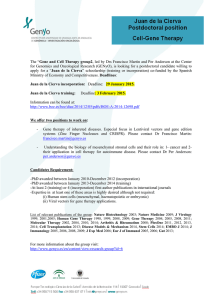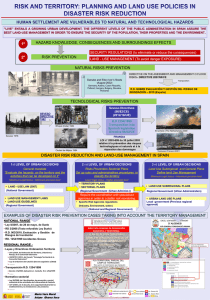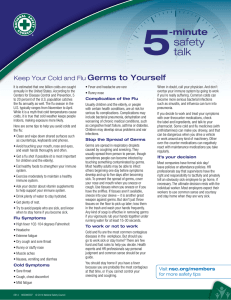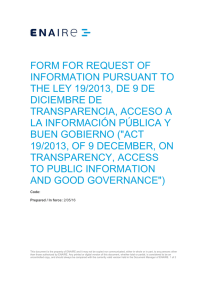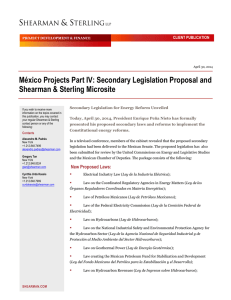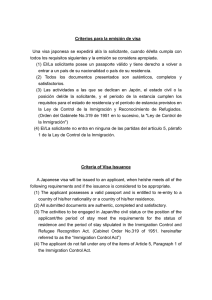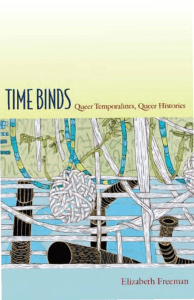click this link
Anuncio
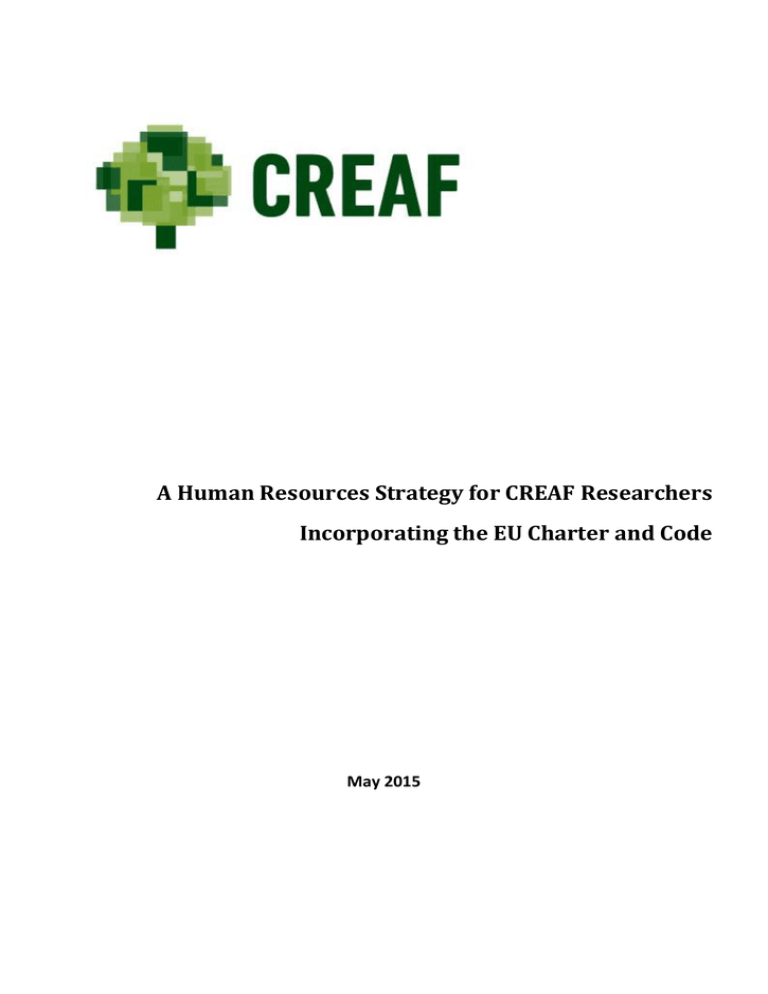
A Human Resources Strategy for CREAF Researchers Incorporating the EU Charter and Code May 2015 Content FOREWORD 1 The European Charter of Researchers and Code of Conduct for the Recruitment of Researchers 1 The Centre 2 INTERNAL ANALYSIS 4 Description of the process 4 Preliminary review of the principles 5 Survey 5 Gap analysis based on the survey answers 10 ACTION PLAN 13 ANNEX 1: National regulations regarding the principles contained in the Charter and Code 17 FOREWORD This document describes the Human Resources Strategy for Researchers (HR Strategy for Researchers) through which the Centre for Ecological Research and Forestry Applications (CREAF) will help its researchers and researchers' employers to incorporate the principles of the European Charter for Researchers and of the Code of Conduct (Charter and Code) in the centre’s day-to-day activity. The document corresponds to the first step of the HR Strategy for Researchers of the centre, it is based on an internal analysis and it deploys an Action Plan with a set of scheduled actions inspired in the Charter and Code principles and endorsed by a set of internal rules and practices. The European Charter of Researchers and Code of Conduct for the Recruitment of Researchers The European Charter for Researchers and Code of Conduct for the Recruitment of Researchers (Charter and Code) are guidelines for best practices in research organisations and universities, both public and private, and individuals within the European Research Area (ERA). They are aimed at promoting equal rights and obligations for researchers throughout Europe, by specifying their roles, responsibilities and entitlements. They are also designed to state responsibilities of funders and/or employers of European researchers in order to guarantee attractive research careers and to improve their working conditions. The roles, responsibilities and entitlements of researchers as well as those of their employers and/or funders are summarized in the general principles of the European Charter for Researchers. The aim of this Charter is to ensure that the relationship between researchers and employers or funders will lead to successful performance in generating, transferring, sharing and disseminating knowledge and technological development, and to the career development of researchers. The Charter also recognises the value of mobility in the professional development of researchers. The Code of Conduct for the recruitment of researchers consists of a set of general principles and requirements that should be followed by employers and/or funders when appointing or recruiting researchers. These principles and requirements are complementary to those outlined in the European Charter for Researchers and are aimed at ensuring transparency in the recruitment process and equal treatment of all applicants. They also are designed to develop an attractive, open and sustainable European labour market for researchers. Institutions and employers adhering to the Code of Conduct 1 will openly demonstrate their commitment to provide fair framework conditions to researchers, having a clear intention to contribute to the advancement of the European Research Area. The Centre The Centre for Ecological Research and Forestry Applications (CREAF) is a public research centre devoted to terrestrial ecology, territorial analysis and global change, pursuing excellence in the generation and transfer of knowledge, management tools and methodologies. As acknowledged in the Centre’s Mission and Vision, the Centre is aims to achieve excellence in research, develop new methodologies, be innovative, promote transference, train and disseminate on topics related to terrestrial ecology and environmental management, and help society adapt to the effects of global change while improving communication between researchers, managers and civil society. Through excellence in research and development, CREAF strives to become a reference research institution in the Mediterranean and world-wide, pushing the frontiers of knowledge while addressing some of the largest and most complex environmental challenges faced by society this century. It aims to pursue these goals together with the development of a researcher working environment based on the Charter and Code principles for EU researchers. The centre is currently composed of 141 people, including 47 researchers that contractually pertain to five independent institutions: CREAF itself, the Autonomous University of Barcelona (UAB), the University of Barcelona (UB), the Spanish National Research Council (CSIC) and the Catalan Institution for Research and Advanced Studies (ICREA): CREAF is currently engaged in the implementation of the 2014-2017 Strategic Plan, which was preceded by a SWOT analysis (i.e. the evaluation of strengths, weaknesses, opportunities and threats) of the 2 centre. This analysis identified the need to implement a research-based differentiation strategy, with the identification of new funding sources, strategic alliances and new stakeholders. This was further defined as the pursuit of excellence in ecological research in the Mediterranean region, the improvement of knowledge transfer, and a rethinking internal organisation to improve the use of human resources and infrastructures. CREAF’s new strategy is being developed through five main axes and 12 strategic objectives (SO) 1. Research: SO-1.1 Carry out research which is excellent, innovative, and leading SO-1.2 Improve the international projection of CREAF and its position as a reference centre for terrestrial ecology and landscape and global change assessment in the Mediterranean region 2. Transference SO-2.1 Improve the transfer of knowledge and tools to public and private sectors SO-2.2 Consolidate CREAF as a centre of support for decision-making in environmental management and planning 3. Organisation SO-3.1 Conduct economic management which improves fundraising and is based on economic sustainability SO-3.2 Set up a strategy of investment and efficient use of infrastructure and services SO-3.3 Establish a strategy for efficient organization SO-3.4 Improve training and skills of staff 4. Training SO-4.1 Promote high-level scientific training. 5. Dissemination SO-5.1 Promote national and international visibility of centre within scientific and technical communities, public administrations and civil society SO-5.2 Improve internal communication SO-5.3 Promote CREAF’s brand CREAF recognizes that research staff merit cannot be evaluated based only on publication rates, but also on fundraising via competitive and non-competitive projects, training of researchers, and knowledge transfer, among others. By adopting the Charter and Code and being acknowledged as having done so, CREAF will achieve a greater level of accountability and clarity supporting these aims all under a clear framework of rights and responsibilities for researchers, ensuring attractive careers and working conditions. The Charter and Code will help CREAF managers select new researchers and will improve productivity of those currently working at the Centre. Managers need to find professionals with a strong background in research management as well as a wide range of competencies beyond the big science indicators, including management and communication skills, teamwork and knowledge transfer, among others. 3 INTERNAL ANALYSIS Description of the process The HR Strategy for Researchers includes five steps: (1) An internal analysis made by the institution according to the Charter & Code principles; (2) on the basis of this analysis, development of the HR Strategy of the centre and its publishing on the institution’s website; (3) the EC acknowledgement that the institution has adopted a Human Resources Strategy for Researchers; (4) a self-assessment conducted by the institution every two years, within the framework of its existing internal quality assurance mechanisms; (5) an external evaluation, performed at least every 4 years, showing the progress made towards the objectives of the HR Strategy for Researchers of the institution and its compliance with the principles of the Charter & Code. The internal analysis process at CREAF was led by the Management Team, following the general guidelines of CERCA (the Agency for Research Centres of Catalonia). The Management Team designated a HRS Commission, representative for CREAF’s staff composition and made up of CREAF researchers (Arnald Marcer, Maria Mayol and Joan Pino), technical staff (Anna Ramon and Anabel Sánchez) and the Administration Manager (José Antonio Fuentes). This commission has then coordinated the internal analysis and the deployment of the resulting HR Strategy for Researchers. In the future, it will coordinate the management of the associated action plan and its further self-assessment after 2 years (step 4 of the HR Strategy). Still, it will facilitate the external review of the plan (step 5) every 4 years. The internal analysis process consisted of the following steps: When What April 2014 Set-up of the HRS4R Commission May-July 2014 Preliminary review of the principles of the Charter and Code; survey design September 2014 First institutional communication and public survey October 2014 Gap analysis based on survey answers November2014-February 2015 Elaboration of the Draft Action Plan April 2015 Approval by the Board of Trustees May 2015 Approval by the CERCA Board May 2015 Publication of the CREAF HR Strategy for Researchers on the Centre's website 4 Preliminary review of the principles The HRS Commission performed a preliminary review of the principles of the Charter and Code and their application to CREAF’s context. This review was performed in a series of meetings in which relevant legislation and internal rules enhancing or constraining the application of these principles – i.e. those affecting research environment, recruitment processes and working conditions - were identified and evaluated. The results of this process are summarized in Annex 1. Survey As a result of the preliminary analysis, an anonymous survey consisting of specific questions based on the Charter's principle statements was performed. In order to ensure anonymity, the survey was performed online using the Google Forms® platform. While specifically oriented to researchers, questions were open to all CREAF staff in order to reflect the broadest view possible. Two basic assessments were required with each question about the Charter principles: - How do you rate the importance of the question, from 1 (very low) to 5 (very high) How far is CREAF from achieving the objective, from 0 (very far) to 5 (already achieved) . A total of 30 questions were asked pertaining the four groups of principles included in the Charter and Code (9 on Ethical and Professional Aspects, 4 on Recruitment, 14 on Working Conditions and Social Security, and 3 on Training). Staff profile sample for the survey Sixty-nine CREAF staff members answered the survey, from a total of 117 staff members (59% participation). Postdoctoral Researcher Senior Researcher Managing staff Technician Pre-doctoral Researcher 5 Category Senior Researcher Post-doctoral Researcher Pre-doctoral Researcher Technician Managing staff TOTAL Answer 22 9 15 13 10 69 The results of the survey are shown in the following table. The percentage of responses, the mean value and the standard deviation obtained for each question are indicated in parentheses. ETHICAL AND PROFESSIONAL ASPECTS 1 To what extent do you think CREAF researchers apply ethical and professional principles in their research (data collection and processing, publication and dissemination of results, etc.)? Importance (98.55%, 4.84, 0.44) Achievement (82.61%, 4.32, 0.74) 2 To what extent do you consider that CREAF researchers are responsible for the management (budget execution, monitoring deadlines, etc.) of research and transfer projects? Importance (97.10%, 4.43, 0.63) Achievement (88.41%, 4.07, 0.83) 3 To what extent do you consider that CREAF researchers are familiar with the legal regulations related to recruitment, Intellectual Property Rights, data protection, patents; etc.? Importance (100%, 4.09, 0.68) Achievement (85.51%, 2.85, 1.00) 4 To what extent do you consider that CREAF researchers make an appropriate, transparent and accountable use of financial resources? Importance (100%, 4.80, 0.44) Achievement (89.86%, 4.26, 0.70) 5 To what extent do you think that CREAF researchers adopt safe working practices regarding data protection and confidentiality of information? Importance (91.30%, 4.03, 0.90) Achievement (75.36%, 3.65, 0.84) 6 6 To what extent do you think that CREAF researchers are involved in the eventual transfer and exploitation of their results? Importance (98.55%, 4.38, 0.79) Achievement (89.86%, 3.37, 1.16) 7 To what extent do you think that CREAF researchers disseminate the results of their research to the general public and take into account their needs and concerns? Importance (98.55%, 4.34, 0.86) Achievement (91.30%, 3.37, 1.11) 8 To what extent do you consider that CREAF doesn’t discriminate against researchers on the basis of gender, age, language, political opinion, etc.? Importance (98.55%, 4.46, 1.19) Achievement (98.55%, 3.41, 1.01) 9 To what extent do you consider that the CREAF’s systems for evaluation of researchers are transparent and are well defined? Importance (94.20%, 4.65, 0.54) Achievement (78.26%, 3.04, 1.06) RECRUITMENT 10 To what extent do you consider that recruitment procedures of new researchers at CREAF are clearly specified with regard to the recruitment process and the selection criteria, the working conditions and entitlements, and the knowledge and competencies required? Importance (98.55%, 4.56, 0.58) Achievement (88.41%, 3.33, 0.89) 11 To what extent do you consider that CREAF has appropriate selection committees, with enough experience and competences to guarantee a suitable selection of candidates? Importance (89.86%, 4.47, 0.67) Achievement (71.01%, 3.24, 1.20) 7 12 To what extent do you think that CREAF selection / recruitment procedures take into account the whole merits of the candidates, apart from the number of publications (e.g. a diversified career, stays in other research centres, capacity of interaction and to develop independent research, etc.)? Importance (86.96%, 4.47, 0.70) Achievement (66.67%, 3.43, 1.09) 13 To what extent do you think CREAF's rules for the appointment of postdoctoral researchers are clear enough concerning the maximum duration and the objectives of such appointments? Importance (85.51%, 4.37, 0.74) Achievement (60.87%, 3.14, 1.14) WORKING CONDITIONS AND SOCIAL SECURITY 14 To what extent do you consider that CREAF researchers are recognized at work and treated accordingly during all levels of their research careers? Importance (92.75%, 4.66, 0.60) Achievement (91.30%, 3.49, 1.03) 15 To what extent do you consider that CREAF provides a stimulating environment for research and training? Importance (100%, 4.77, 0.46) Achievement (98.55%, 4.00, 0.85) 16 To what extent do you consider that CREAF provides appropriate facilities and equipment that ensure health and safety in research? Importance (100%, 4.71, 0.49) Achievement (98.55%, 3.53, 0.95) 17 To what extent do you consider that CREAF provides working conditions allowing the reconciliation of work and family life? Importance (100%, 4.72, 0.59) Achievement (97.10%, 4.10, 0.89) 18 To what extent do you value the professional stability offered by CREAF? Importance (100%, 4.55, 0.68) 8 Achievement (97.10%, 3.01, 1.15) 19 To what extent do you think that CREAF has an adequate remuneration policy, sufficiently explicit and public? Importance (91.30%, 4.65, 0.57) Achievement (81.16%, 3.52, 1.22) 20 To what extent do you consider that CREAF promotes an appropriate gender balance policy at all levels of staff, including positions of major responsibility? Importance (95.65%, 4.53, 0.64) Achievement (79.71%, 3.25, 1.31) 21 To what extent do you think that CREAF values and promotes staff mobility, both geographical and transdisciplinary, and between the public and private sectors? Importance (89.86%, 4.06, 0.81) Achievement (78.26%, 3.13, 1.03) 22 To what extent do you think that CREAF provides career advice to its researchers during all stages of their careers? Importance (88.41%, 4.30, 0.82) Achievement (79.71%, 2.87, 1.17) 23 To what extent do you think that CREAF has a clear and appropriate intellectual property policy, including copyrights? Importance (82.61%. 3.95, 0.89) Achievement (50.72%, 2.80, 1.45) 24 To what extent do you think that CREAF values the collaboration of early stage researchers with other research groups (internal or external), promoting co-authorship of papers or other scientific works? Importance (86.96%, 4.32, 0.70) Achievement (76.81%, 3.40, 1.34) 25 To what extent do you think that senior researchers and PhD supervisors are involved in the scientific training of early stage researchers? Importance (92.75%, 4.63, 0.52) Achievement (85.51%, 3.88, 0.91) 9 26 To what extent do you think that CREAF has appropriate procedures to deal with complaints/appeals of researchers and labour dispute settlement? Importance (100%, 4.48, 0.68) Achievement (84.06%, 3.09, 1.14) 27 To what extent do you think that CREAF promotes the participation of researchers in the governance of the centre? Importance (97.10%, 4.25, 0.70) Achievement (85.51%, 3.07, 1.14) TRAINING 28 To what extent do you think that CREAF promotes leadership training of its researchers (team management, project leadership, supervision and mentoring, transfer of knowledge, etc.)? Importance (94.20%, 4.17, 0.65) Achievement (91.30%, 2.40, 1.07) 29 To what extent do you think that CREAF stimulate the continued training of researchers through formal training, seminars, workshops, conferences or e-learning? Importance (97.10%, 4.48, 0.59) Achievement (94.20%, 3.65, 1.07) 30 To what extent do you think that CREAF has an appropriate system of supervision of the development of doctoral theses and the relationship between PhDs and supervisors? Importance (88.41%, 4.34, 0.68) Achievement (82.61%, 3.49, 1.14) Gap analysis based on the survey answers Once the answers were gathered and checked, an in-depth analysis was carried out. In general, no relevant differences in responses between staff categories were detected. The mean value of answers pertaining to achievement was 3.34, which positions the mean global value of the answers at the middle to high end of the range. Achievement scores of questions were quite similar among the four groups of principles. Only 4 questions showed a mean score of less than 3 (low). These questions made reference to familiarity with legal regulations related to recruitment, data protection and property rights (question 3), career advice (question 22), intellectual property policy (question 23) and leadership training 10 (question 28). Two more questions showing values close to 3 made reference to transparency of evaluation systems for recruitment (question 9), and professional stability offered by CREAF (question 18). The deficiencies detected were the starting point for defining actions to normalize CREAF policies with the Charter and Code principles. Special effort was made to detect correspondence between these actions and those planned in the recently approved CREAF Strategic Plan (2014-2017), pertaining to diverse strategic objectives for research, organization, and training. In some cases, survey question topics were not associated with an action, mostly because of the limited capacity of CREAF to promote effective actions on some of these queried topics. This was the case for question 18, relating to professional stability (which strongly depends on public position offers), and question 24 regarding the collaboration and co-authorship of junior researchers with other research groups (of complex regulation as it strongly depends on the dynamics of particular research groups). These questions will be eventually addressed in further action plans, after the evaluations foreseen in steps 4 and 5 of this strategy. Other questions for which no actions have been proposed are those which were rated with a sufficiently positive assessment, taken to mean that the item was already satisfactorily implemented within CREAF, as was the case for questions 2 and 4 (project management and use of financial resources by researchers), and working conditions allowing reconciliation with family life (question 17). In contrast, the HRS Commission considered that developing the CREAF Code of Ethics and Good Scientific Practice is especially important for maintaining the quality of research in the future, despite the associated question (2) was rated with a very positive assessment by CREAF’s staff. 11 12 ACTION PLAN This table summarizes the actions included in the Human Resources Strategy for CREAF researchers, the principles of the Charter and Code they are based on, their planned schedule and executor, the CREAF’s existing rules and/or practices that support their execution, and the proposed measurable indicator of their progress. Scheduling is indicated in trimesters (T1 to T4) of the corresponding years. Planned Action Principle Develop the CREAF Code of Ethics and Good Scientific Practice and define actions for implementation. 2 2 Draw up an internal regulation on intellectual property rights and results exploitation. 5+31 3 Draw up an internal protocol on data protection according to the existing national legal requirements regarding data protection and confidentiality. 4 Train on issues related to intellectual property rights regulations, new products development and patents, data protection, publications and 1 When Who Existing CREAF rules and/or practices T4 2016 to Ethics Commission - Code of Ethics and Good Scientific Practice T1/T2 2017 CREAF Managing Staff - Protocol on Intellectual Property Rights T1/T2 2017 CREAF Managing Staff - Protocol on Data Protection and Confidentiality Administration Manager - Number of courses and people trained. Participant feedback T1 2017 7 T4 2017 5 T4 2018 13 Indicator transfer of results. (Satisfaction survey) 5 Draw up an internal protocol on knowledge transfer to potential users. 6 Improve the existing CREAF webpage, blog and newsletter with technical reports that can be used by journalists to make CREAF's research accessible/understandable to the general public. 9 T3 2015 7 Produce a Strategic Equality Plan aiming to promote equality in age, disability, gender, race and religion. 10+27 8 Strengthen gender balance at selection and evaluation committees, as well as supervisory, managerial and decision-making bodies of CREAF. 9 Revise the current Company Agreement of CREAF regarding professional categories, salaries and pathways for internal promotion, including clear and transparent appraisal systems and a qualityin-research-oriented incentive programme. 8 27 11+22+26 Knowledge Transfer Commission - Protocol on Knowledge Transfer Communication Department - Documentation & number of references in the trade press and mass media T3/T4 2015 Equality Committee - Strategic Equality Plan 2016-2018 CREAF Managing Staff - Ratio male/females in advisory boards and evaluation committees. T1/T2 2016 CREAF Managing Staff 2010 Company Agreement T2/T3 2017 14 New Company Agreement 10 Draw up a new Protocol on Recruitment and Selection of CREAF personnel containing the C&C principles. 12+13+15 +21 (Recruitment procedures) 14+16+18 (Selection procedures) 2010 Protocol on Recruitment and Selection of Researchers New Protocol on Recruitment and Selection of Researchers T3/T4 2015 CREAF Managing Staff 23+35 T3 2015 Staff Meeting Commission - Meeting minutes of the Staff Meeting Commission 11 Create the CREAF research staff meeting. 12 Create an informal meeting space for researchers. 23 T4 2017 Staff Meeting Commission - Informal meeting space created 13 Obtain the certificate of Quality Management System of research according to ISO 9001:2008 standards. 23 T3/T4 2018 Administration Manager - Certificate of Quality Management System 14 Increase collaboration of CREAF researchers with different expertise in highly integrative research projects that take advantage of the multidisciplinarity of CREAF and its partners. 29 T3/T4 2018 Scientific Coordinator - Number of highly integrative projects 15 Draw up a researcher exchange programme to attract foreign researchers and facilitate stays abroad for CREAF researchers. 29 T1/T2 2018 Scientific Coordinator - Researcher Exchange Programme 15 T3 2015 16 Provide training sessions on the strategic vision, governance and structure of the Centre for all professional categories. T3 2016 30+37 T3 2017 Administration Manager - Number of courses and people trained. Participant feedback (satisfaction survey) - Number of courses and people trained. Participant feedback (satisfaction survey) T3 2018 17 Provide specialized training sessions on team management and group leadership for researchers. 18 Set up a seminar program to increase the quantity and quality of the seminars and specialized training courses offered by CREAF. 19 Improve the annual evaluation and review of doctoral theses of the CREAF PhD programme. 33+37 38+39 36+40 T1/T2 2016 CREAF Managing Staff T4 2016 Seminar Coordinator - Number of seminars and training courses. Participant feedback (satisfaction survey) PhD Programme Coordinator Annual evaluation and review of thesis development* New procedures to supervise doctoral theses of the CREAF PhD programme T1/T2 2016 *(http://www.uab.cat/web/postgraduate/phds/all-phd-programmes/review/evaluation-and-review/terrestrial-ecology1345467765260.html?param2=1345657422908 16 ANNEX 1. National regulations and proposed actions regarding the principles contained in the Charter and Code. Regulations are reported in their original language. English translations are provided for the most relevant regulations only in the first citation. Only the principles accounting for regulations are included. See Action Plan for a complete description of actions. I. ETHICAL AND PROFESSIONAL ASPECTS 1. Research freedom Relevant legislation Existing Institutional rules and/or practices Constitución Española Art. 44, 20, 149 Link Proposed actions http://www.boe.es/buscar/act.php?id=BO E-A-1978-31229 (Spanish Constitution) CREAF Statutes Ley 14/2011 de 1 de junio de la Ciencia, la Tecnología y la innovación http://dogc.gencat.cat/es/pdogc_canals_i nterns/pdogc_resultats_fitxa/index.html?a ction=fitxa&documentId=549259&languag e=ca_ES&newLang=es_ES http://www.boe.es/boe/dias/2011/06/02/ pdfs/BOE-A-2011-9617.pdf (Spanish Law 14/2011, of Science, Technology and Innovation) 2. Ethical principles Ley 7/2007 del Estatuto Básico del Empleado Público Cap. IV http://www.boe.es/boe/dias/2007/04/13/ pdfs/A16270-16299.pdf (Spanish Law 7/2007, Statute of Public Officials) 1. Develop the CREAF Code of Ethics and Good Scientific Practice and define actions 17 Ley 14/2011 de 1 de junio de la Ciencia, la Tecnología y la innovación http://www.boe.es/boe/dias/2011/06/02/ pdfs/BOE-A-2011-9617.pdf for implementation. 3. Professional responsibility Ley 14/2011 de 1 de junio de la Ciencia, la Tecnología y la innovación http://www.boe.es/boe/dias/2011/06/02/ pdfs/BOE-A-2011-9617.pdf 4. Professional attitude Real Decreto 63/2006 Estatuto del personal investigador en formación http://www.boe.es/boe/dias/2006/02/03/ pdfs/A04178-04182.pdf (Spanish Royal Decree 63/2006 of Researchers at training stages) 5. Contractual and legal obligations Real decreto legislativo 1/1995 de 24 de marzo, Ley del Estatuto de los trabajadores http://www.boe.es/boe/dias/1995/03/29/ pdfs/A09654-09688.pdf (Spanish Royal Decree 1/1995, Workers Statute) Real Decreto 63/2006 Estatuto del personal investigador en formación http://www.boe.es/boe/dias/2006/02/03/ pdfs/A04178-04182.pdf Ley 11/86 de 20 de marzo de Patentes http://www.boe.es/boe/dias/1986/03/26/ pdfs/A11188-11208.pdf (Spanish Law 11/86, of patents) Real decreto 55/2002 de 18 enero sobre explotación y cesión de invenciones http://www.boe.es/boe/dias/2002/01/30/ pdfs/A03691-03692.pdf 18 2. Draw up an internal regulation on intellectual property rights and results exploitation. (Spanish Royal Decree 55/2002 on use of inventions by public research institutions) 4. Train on issues related to intellectual property rights regulations, new products development and patents, data protection, publications and transfer of results. 6. Accountability Ley 38/2003 de 17 de noviembre General de subvenciones http://www.boe.es/buscar/pdf/2003/BOEA-2003-20977-consolidado.pdf Ley 14/2011 de 1 de junio de la Ciencia, la Tecnología y la innovación http://www.boe.es/boe/dias/2011/06/02/ pdfs/BOE-A-2011-9617.pdf Real decreto Legislativo 3/2011 contratos del sector público. http://www.boe.es/buscar/pdf/2011/BOEA-2011-17887-consolidado.pdf Ley 19/2014 de transparencia y Buen gobierno http://portaldogc.gencat.cat/utilsEADOP/ PDF/6780/1395384.pdf 7. Good practice in research Constitución Española Art. 40,2 http://www.boe.es/buscar/act.php?id=BO E-A-1978-31229 Ley 31/1995 de 8 de noviembre de prevención de riesgos laborales http://www.boe.es/boe/dias/1995/11/10/ pdfs/A32590-32611.pdf (Spanish Law 31/1995, of prevention of workplace risks) Ley 14/2011 de 1 de junio de la Ciencia, la Tecnología y la innovación http://www.boe.es/boe/dias/2011/06/02/ pdfs/BOE-A-2011-9617.pdf Ley Orgánica 15/1999 de 13 de diciembre de Protección de datos http://www.boe.es/boe/dias/1999/12/14/ pdfs/A43088-43099.pdf 19 3. Draw up an internal protocol on data protection according to the existing national legal requirements regarding data protection and confidentiality. de Carácter personal CREAF Workplace Risk Prevention Plan 8. Dissemination, exploitation of results Ley 14/2011 de 1 de junio de la Ciencia, la Tecnología y la innovación http://www.boe.es/boe/dias/2011/06/02/ pdfs/BOE-A-2011-9617.pdf Real decreto 55/2002 de 18 de enero sobre explotación y cesión de invenciones http://www.boe.es/boe/dias/2002/01/30/ pdfs/A03691-03692.pdf 5. Draw up an internal protocol on knowledge transfer to potential users. 9. Public engagement Ley 14/2011 de 1 de junio de la Ciencia, la Tecnología y la innovación http://www.boe.es/boe/dias/2011/06/02/ pdfs/BOE-A-2011-9617.pdf 6. Improve the existing CREAF webpage, blog and newsletter with technical reports that can be used by journalists to make CREAF's research accessible/ understandable to the general public. 10. Non-discrimination Constitución española Art. 14/9,2/35,1 http://www.boe.es/buscar/act.php?id=BO E-A-1978-31229 Real Decreto 1/1995 de 24 de Ley del Estatuto de los trabajadores. Sección 2ª Art. 4,2 & 17,1 http://www.boe.es/boe/dias/1995/03/29/ pdfs/A09654-09688.pdf Ley 7/2007 del Estatuto Básico http://www.boe.es/boe/dias/2007/04/13/ pdfs/A16270-16299.pdf del Empleado Público Ch. I Art. 14 Ley Orgánica 3/2007 de 22 de marzo para la igualdad efectiva de mujeres y hombres. http://www.boe.es/boe/dias/2007/03/23/ pdfs/A12611-12645.pdf (Spanish Organic Law 3/2007, for 20 7. Produce a Strategic Equality Plan aiming to promote equality in age, disability, gender, race and religion. the equality of women and men) 11. Evaluation / appraisal systems Ley 38/2003 de 17 de noviembre. General de subvenciones Art. 22 http://www.boe.es/buscar/pdf/2003/BOEA-2003-20977-consolidado.pdf RD 887/2006 de 21 julio, por el que se aprueba el Reglamento de la ley 38/2003 General de Subvenciones http://www.minhap.gob.es/Documentacio n/Publico/NormativaDoctrina/Control%20 Publico/REAL%20DECRETO/REAL%20DECR ETO%208872006%20%20REVISADO%20%2013-32012.pdf Ley 7/2007 del Estatuto Básico http://www.boe.es/boe/dias/2007/04/13/ pdfs/A16270-16299.pdf del Empleado Público Cap. II Art. 20 Ley 14/2011 de la ciencia y tecnología Art. 5,16 y 25,5 y disposición transitoria 5ª Sistemas de evaluación del desempeño http://www.boe.es/boe/dias/2011/06/02/ pdfs/BOE-A-2011-9617.pdf 2010 Company Agreement II. RECRUITMENT 12. Recruitment Ley 7/2007, de 12 de abril Estatuto Básico del Empleado http://www.boe.es/boe/dias/2007/04/13/ pdfs/A16270-16299.pdf 21 9. Revise the current Company Agreement of CREAF regarding professional categories, salaries and pathways for internal promotion, including clear and transparent appraisal systems and a quality-in-research-oriented incentive programme. Público. Art. 61 Ley 14/2011 de 1 de junio de la Ciencia, la Tecnología y la innovación Art. 16 y Art. 25 http://www.boe.es/boe/dias/2011/06/02/ pdfs/BOE-A-2011-9617.pdf Real Decreto 63/2006 Estatuto del personal investigador en formación. Art. 8 http://www.boe.es/boe/dias/2006/02/03/ pdfs/A04178-04182.pdf 10. Draw up a new Protocol on Recruitment and Selection of CREAF personnel containing the C&C principles. 13. Recruitment (Code) Ley 7/2007, de 12 de abril Estatuto Básico del Empleado Público. Art.55.2 y 61 http://www.boe.es/boe/dias/2007/04/13/ pdfs/A16270-16299.pdf Ley 14/2011 de 1 de junio de la Ciencia, la Tecnología y la innovación Art. 16 y Art. 25 http://www.boe.es/boe/dias/2011/06/02/ pdfs/BOE-A-2011-9617.pdf Real Decreto 63/2006 Estatuto del personal investigador en formación. Art. 8 http://www.boe.es/boe/dias/2006/02/03/ pdfs/A04178-04182.pdf 10. Draw up a new Protocol on Recruitment and Selection of CREAF personnel containing the C&C principles. 2010 Protocol on Recruitment and Selection of Researchers 14. Selection (Code) Ley 7/2007, de 12 de abril Estatuto Básico del Empleado Público Art. 60 http://www.boe.es/boe/dias/2007/04/13/ pdfs/A16270-16299.pdf Ley 14/2011 de 1 de junio de la Ciencia, la Tecnología y la innovación Art. 5.2 y Art. 15 http://www.boe.es/boe/dias/2011/06/02/ pdfs/BOE-A-2011-9617.pdf 2010 Protocol on 22 10. Draw up a new Protocol on Recruitment and Selection of CREAF personnel containing the C&C principles. Recruitment and Selection of Researchers 15. Transparency (Code) Ley 7/2007, de 12 de abril EBEP. Art. 55.2 http://www.boe.es/boe/dias/2007/04/13/ pdfs/A16270-16299.pdf Ley 14/2011 de 1 de junio de la Ciencia, la Tecnología y la innovación Art. 5 http://www.boe.es/boe/dias/2011/06/02/ pdfs/BOE-A-2011-9617.pdf Ley 38/2003 de 17 de noviembre. General de subvenciones Art. 8 / 9 / 17 / 23 / http://www.boe.es/buscar/pdf/2003/BOEA-2003-20977-consolidado.pdf 10. Draw up a new Protocol on Recruitment and Selection of CREAF personnel containing the C&C principles. Ley 19/2014 de transparencia y Buen gobierno 16. Judging merit (Code) Constitución Española Art. 44.2 y 149.1 http://www.boe.es/buscar/act.php?id=BO E-A-1978-31229 Ley 14/2011 de 1 de junio de la Ciencia, la Tecnología y la innovación Art. 26 http://www.boe.es/boe/dias/2011/06/02/ pdfs/BOE-A-2011-9617.pdf Ley 38/2003 de 17 de noviembre. General de subvenciones Art. 23,2 y 24.3.b http://www.boe.es/buscar/pdf/2003/BOEA-2003-20977-consolidado.pdf RD 887/2006 de 21 julio, por el que se aprueba el Reglamento de la ley 38/2003 General de Subvenciones Art. 60 http://www.boe.es/boe/dias/2006/07/25/ pdfs/A27744-27775.pdf 23 10. Draw up a new Protocol on Recruitment and Selection of CREAF personnel containing the C&C principles. 17. Variations in the chronological order of CVs (Code) Ley 14/2011 de 1 de junio de la Ciencia, la Tecnología y la innovación. Sección II y Capítulo II Art. 26 http://www.boe.es/boe/dias/2011/06/02/ pdfs/BOE-A-2011-9617.pdf Real Decreto 1/1995 de 24 de marzo, Ley del Estatuto de los trabajadores. Art. 11 http://www.boe.es/boe/dias/1995/03/29/ pdfs/A09654-09688.pdf 18. Recognition of mobility experience (Code) Ley 14/2011 de 1 de junio de la Ciencia, la Tecnología y la innovación. Art. 37 http://www.boe.es/boe/dias/2011/06/02/ pdfs/BOE-A-2011-9617.pdf Real Decreto 1/1995 de 24 de marzo. Ley del Estatuto de los trabajadores. Art. 12 y 15. http://www.boe.es/boe/dias/1995/03/29/ pdfs/A09654-09688.pdf 19. Recognition of qualifications (Code) Real Decreto 63/2006 Estatuto del personal investigador en formación. Art. 1.2 y Art. 8.2 http://www.boe.es/boe/dias/2006/02/03/ pdfs/A04178-04182.pdf Real Decreto 778/1998 de 30 de abril por el que se regula el tercer ciclo de estudios universitarios, la obtención y expedición del título de Doctor y otros estudios de postgrado http://www.boe.es/boe/dias/1998/05/01/ pdfs/A14688-14696.pdf Real Decreto 56/2005 Estudios Universitarios Oficiales de Postgrado http://www.boe.es/boe/dias/2005/01/25/ pdfs/A02846-02851.pdf Real Decreto 1393/2007 Ordenación de las enseñanzas Universitarias oficiales http://www.boe.es/boe/dias/2007/10/30/ pdfs/A44037-44048.pdf 24 10. Draw up a new Protocol on Recruitment and Selection of CREAF personnel containing the C&C principles. Real decreto 1837/2008 reconocimiento de cualificaciones profesionales. http://www.mecd.gob.es/dmsstatic/d0696916-b19a-492f-a6294820e0b6c59d/2010-1837-2008-pdf.pdf 20. Seniority (Code) 2010 Company Agreement 21. Postdoctoral appointments (Code) Ley 14/2011 de 1 de junio de la Ciencia, la Tecnología y la innovación Art. 20 / 21 / 22 http://www.boe.es/boe/dias/2011/06/02/ pdfs/BOE-A-2011-9617.pdf Real Decreto 63/2006 Estatuto del personal investigador en formación. http://www.boe.es/boe/dias/2006/02/03/ pdfs/A04178-04182.pdf 10. Draw up a new Protocol on Recruitment and Selection of CREAF personnel containing the C&C principles. Disposición Adicional sexta III. WORKING CONDITIONS AND SOCIAL SECURITY 22. Recognition of the profession Ley 14/2011 de 1 de junio de la Ciencia, la Tecnología y la innovación Art. 14 / 25 /27 http://www.boe.es/boe/dias/2011/06/02/ pdfs/BOE-A-2011-9617.pdf 9. Revise the current Company Agreement of CREAF regarding professional categories, salaries and pathways for internal promotion, including clear and transparent appraisal systems and a quality-in-research-oriented incentive programme. http://www.boe.es/boe/dias/2011/06/02/ 11. Create the CREAF research staff 2010 Company Agreement 23. Research environment Ley 14/2011 de 1 de junio de la Ciencia, la Tecnología y la 25 innovación. pdfs/BOE-A-2011-9617.pdf Disposición adicional octava meeting. 12. Create an informal meeting space for researchers. 13. Obtain the certificate of Quality Management System of research according to ISO 9001:2008 standards. 24. Working conditions Ley 14/2011 de 1 de junio de la Ciencia, la Tecnología y la innovación Art. 14-j http://www.boe.es/boe/dias/2011/06/02/ pdfs/BOE-A-2011-9617.pdf Ley Orgánica 3/2007 de 22 de marzo para la igualdad efectiva de mujeres y hombres. Art. 44,51 & 56 http://www.boe.es/boe/dias/2007/03/23/ pdfs/A12611-12645.pdf 25. Stability and permanence of employment Ley 14/2011 de 1 de junio de la Ciencia, la Tecnología y la innovación Art. 20 y Art. 25 http://www.boe.es/boe/dias/2011/06/02/ pdfs/BOE-A-2011-9617.pdf Directiva 1999/70/CE de 28 de junio de 1999 sobre el trabajo de duración determinada. http://eurlex.europa.eu/LexUriServ/LexUriServ.do?u ri=OJ:L:1999:175:0043:0048:ES:PDF 26. Funding and salaries Real Decreto 63/2006 Estatuto del personal investigador en formación. Art. 5 http://www.boe.es/boe/dias/2006/02/03/ pdfs/A04178-04182.pdf Real Decreto 1/1995. Ley del Estatuto de los trabajadores. Art. 11.e) Contratos formativos. Art. 26.3 del Salario, Art. 37 Descanso semanal, fiestas y permisos. http://www.boe.es/boe/dias/1995/03/29/ pdfs/A09654-09688.pdf 26 9. Revise the current Company Agreement of CREAF regarding professional categories, salaries and pathways for internal promotion, including clear and transparent appraisal systems and a quality-in-research- Real Decreto 1/1994 de 20 de junio. Ley General de la Seguridad Social Art. 124, Capitulo IV Bis, Titulo III Protección por desempleo. http://www.boe.es/boe/dias/1994/06/29/ pdfs/A20658-20708.pdf oriented incentive programme.. Constitución Española, Art. 14 http://www.boe.es/buscar/act.php?id=BO E-A-1978-31229 7. Produce a Strategic Equality Plan aiming to promote equality in age, disability, gender, race and religion. Ley Organica 3/2007 de 22 de marzo para la igualdad efectiva de mujeres y hombres. Art. 5 TITULO V http://www.boe.es/boe/dias/2007/03/23/ pdfs/A12611-12645.pdf 8. Strengthen gender balance at selection and evaluation committees, as well as supervisory, managerial and decisionmaking bodies of CREAF. Art. 205 &206 2010 Company Agreement 27. Gender balance (Spanish Organic Law 3/2007, for the equality of women and men) 28. Career development Ley 14/2011 de 1 de junio de la Ciencia, la Tecnología y la innovación Art. 6 / 12/ 13 /14 y 25 http://www.boe.es/boe/dias/2011/06/02/ pdfs/BOE-A-2011-9617.pdf Ley 7/2007, de 12 de abril Estatuto Básico del Empleado Público. Cap. II Derecho a la Carrera profesional y a la promoción interna. http://www.boe.es/boe/dias/2007/04/13/ pdfs/A16270-16299.pdf 27 29. Value of mobility Ley 14/2011 de 1 de junio de la Ciencia, la Tecnología y la innovación Art. 17 de la movilidad del personal investigador. http://www.boe.es/boe/dias/2011/06/02/ pdfs/BOE-A-2011-9617.pdf 14. Increase collaboration of CREAF researchers with different expertise in highly integrative research projects that take advantage of the multidisciplinarity of CREAF and its partners. 15. Draw up a researcher exchange programme to attract foreign researchers and facilitate stays abroad for CREAF researchers. 30. Access to career advice 16. Provide training sessions on the strategic vision, governance and structure of the Centre for all professional categories. 31. Intellectual Property Rights Ley 14/2011 de 1 de junio de la Ciencia, la Tecnología y la innovación Art. 35 http://www.boe.es/boe/dias/2011/06/02/ pdfs/BOE-A-2011-9617.pdf RD legislativo 1/1996 de 12 de abril. Ley de Propiedad Intelectual. (Libro I. Art. 7 y. 10) http://www.boe.es/boe/dias/1996/04/22/ pdfs/A14369-14396.pdf (Spanish Royal Decree 1/1996. Law of Intellectual Property) Ley 11/86 de 20 de marzo de patentes. Art. 1,2,3,4,5. Disposición Adicional 1ª y 2ª y Disposición T. Única. http://www.boe.es/boe/dias/1986/03/26/ pdfs/A11188-11208.pdf Ley 20/2003 de 7 de julio de Protección Jurídica del Diseño http://www.boe.es/boe/dias/2003/07/08/ pdfs/A26348-26368.pdf 28 2. Draw up an internal regulation on intellectual property rights and results exploitation. Industrial y su Reglamento de Ejecución Real Decreto 55/2002 de 18 de enero, sobre explotación y cesión de invenciones http://www.boe.es/boe/dias/2002/01/30/ pdfs/A03691-03692.pdf 33. Teaching Ley 14/2011 de 1 de junio de la Ciencia, la Tecnología y la innovación Art. 31 http://www.boe.es/boe/dias/2011/06/02/ pdfs/BOE-A-2011-9617.pdf 17. Provide specialized training sessions on team management and group leadership for researchers. http://www.boe.es/boe/dias/2011/06/02/ pdfs/BOE-A-2011-9617.pdf 11. Create the CREAF research staff meeting. http://www.boe.es/boe/dias/2006/02/03/ pdfs/A04178-04182.pdf 19. Improve the annual evaluation and review of doctoral theses of the CREAF PhD programme. 35. Participation in decision-making bodies Ley 14/2011 de 1 de junio de la Ciencia, la Tecnología y la innovación, Art. 8,9,10 IV. TRAINING 36. Relation with supervisors RD 63/2006 de 27 de enero por el que se aprueba el Estatuto del personal investigador en formación. Art. 7 (D. Adicional 6ª) 37. Supervision and managerial duties 16. Provide training sessions on the strategic vision, governance and structure of the Centre for all professional categories. 17. Provide specialized training sessions on team management and group 29 leadership for researchers. 38. Continuing professional development Ley 14/2011 de 1 de junio de la Ciencia, la Tecnología y la innovación Art. 14.1-k http://www.boe.es/boe/dias/2011/06/02/ pdfs/BOE-A-2011-9617.pdf Ley 7/2007, de 12 de abril Estatuto Básico del Empleado Público. http://www.boe.es/boe/dias/2007/04/13/ pdfs/A16270-16299.pdf Art. 14.1-g Real Decreto 63/2006 Estatuto del personal investigador en formación. Art. 4 & 5 18. Set up a seminar program to increase the quantity and quality of the seminars and specialized training courses offered by CREAF. http://www.boe.es/boe/dias/2006/02/03/ pdfs/A04178-04182.pdf 39. Access to research training and continuous development Ley 14/2011 de 1 de junio de la Ciencia, la Tecnología y la innovación Art. 14.1-k http://www.boe.es/boe/dias/2011/06/02/ pdfs/BOE-A-2011-9617.pdf Ley 7/2007, de 12 de abril Estatuto Básico del Empleado Público Art. 14.1-g http://www.boe.es/boe/dias/2007/04/13/ pdfs/A16270-16299.pdf Real Decreto 63/2006 Estatuto del personal investigador en formación. Art. 4 & 5 http://www.boe.es/boe/dias/2006/02/03/ pdfs/A04178-04182.pdf 18. Set up a seminar program to increase the quantity and quality of the seminars and specialized training courses offered by CREAF. 40. Supervision Annual evaluation and review of thesis development (http://www.uab.cat/web/postgraduate/ phds/all-phdprogrammes/review/evaluation-andreview/terrestrial-ecology1345467765260.html?param2=134565742 2908) 30 19. Improve the annual evaluation and review of doctoral theses of the CREAF PhD programme.
